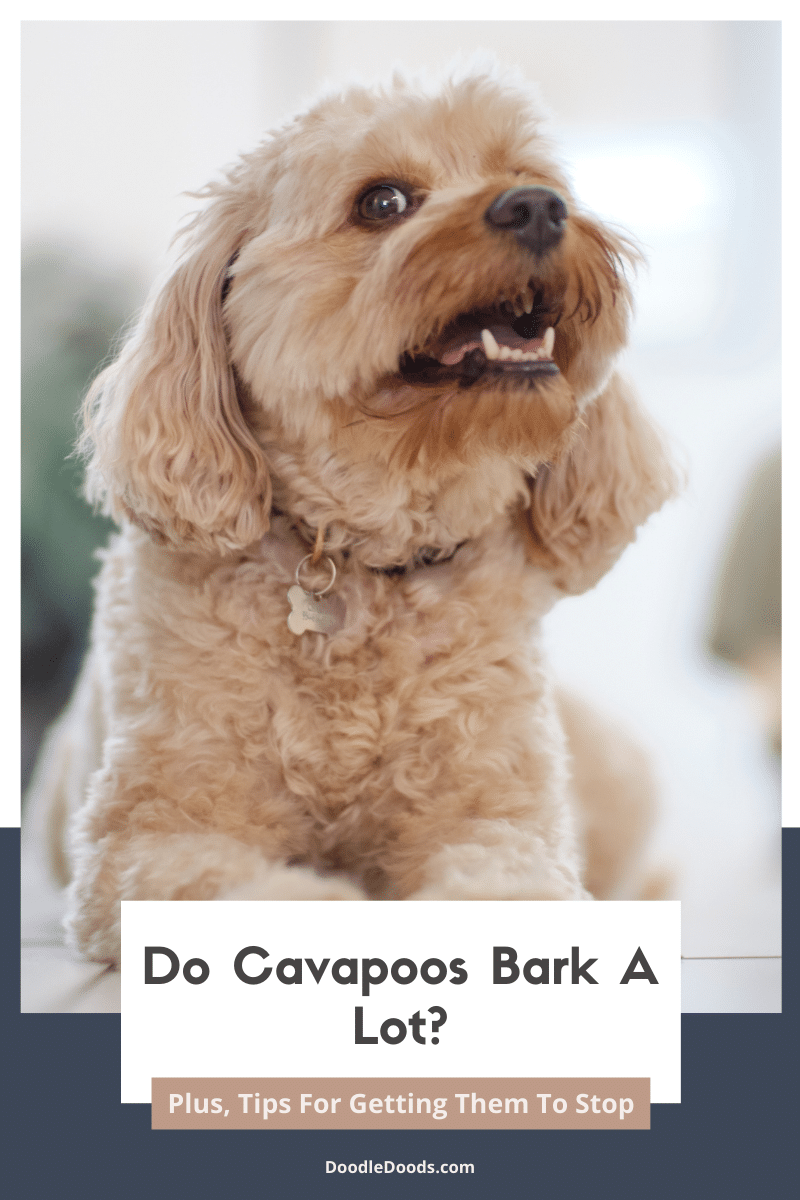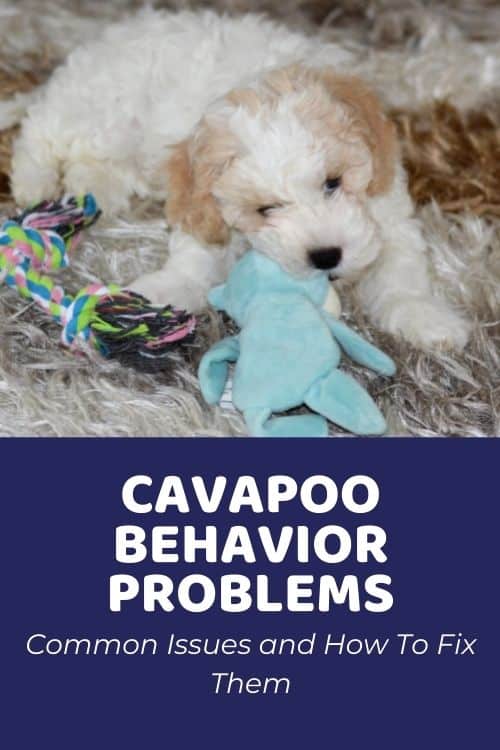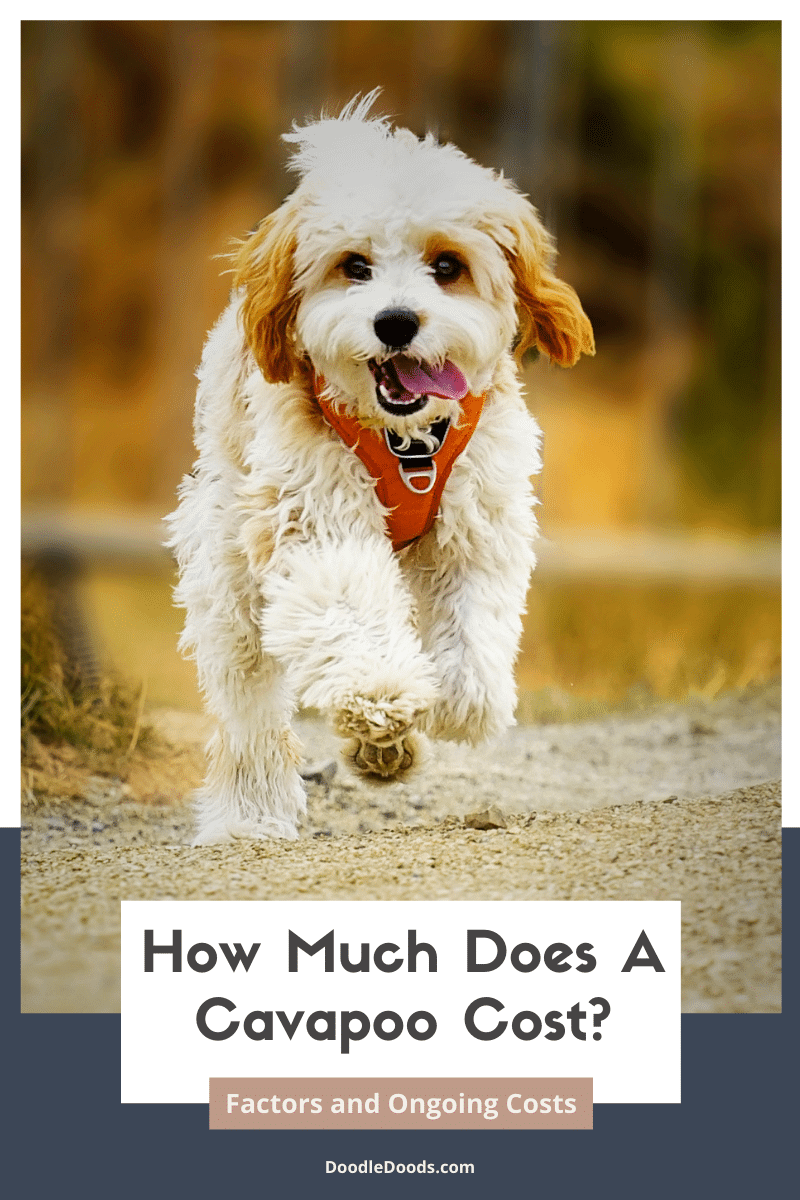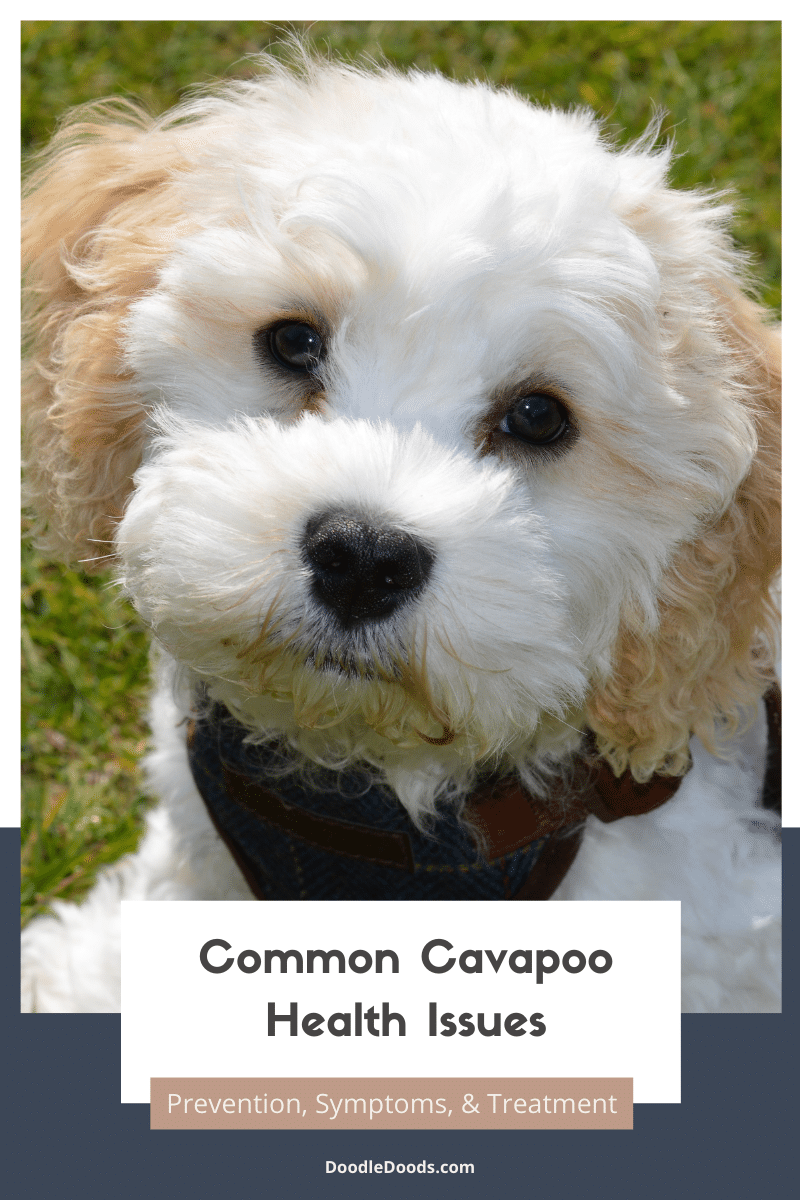Cavapoos are the perfect choice for any family looking to adopt a low-shedding pup that’s on the small side. What makes these dogs so great, even for those with children, is that they are highly adaptable, sociable and love to play almost as much as they love to snuggle. However, if you’re looking to take on one of these dinky Doods, you’ll likely have a few questions, and one of them could very well be, do Cavapoos bark a lot?
The truth is, while all dogs have the potential to be loud, some breeds excel at it more than others. Here we’ll take a look at how Cavapoos do on the noisy canine scale, some of the reasons your pup might be barking, and we’ll even cover a few things you can do (and not do!) about it.
Table of Contents
- Do Cavapoos Bark A Lot?
- Why Cavapoos Bark
- Getting Your Cavapoo Not To Bark
- What To Avoid When Encouraging Your Cavapoo Not To Bark
- Frequently Asked Questions About Cavapoo Barking
- Final Thoughts
Do Cavapoos Bark A Lot?
As we touched on above, there are breed distinctions when it comes to excessive barking. Now, you likely already know that the Cavapoo comes from combing the smart, sassy Poodle with the cute and cuddly Cavalier King Charles Spaniel, so to understand the likelihood of your potential new puppy being the talk of your neighborhood – and not in a good way(!), we need to take a look at whether these two breeds have a tendency towards barking.
Well, the good news is that neither breed can typically be found listed among the noisiest of dogs on any expert website. These top spots tend to be reserved for dogs selectively bred to guard or alert their owners to the presence of something and the teeniest of pups, such as the Chihuahua or the Pomeranian. So take heart that barking is less of an instinct for Cavapoos than other Doodles. That being said, certain environmental factors can nudge even the quietest of pups toward this delightful habit.
Why Cavapoos Bark
Barking can be challenging to decode. Sometimes it may be obvious why your dog is having a bit of a mad spell, whereas, at other times, it can be a complete mystery. The trouble is, if you want to actually be able to do something to discourage the behavior, you need to be fully aware of what lies behind it. Here are some of the main reasons Cavapoos bark:
They Are Excited
In smaller dogs, such as the Cavapoo, barking is typically emotion-based. In such happy-go-lucky canines, this emotion is often excitement. Whether it happens as you’re pulling out their leash for a walk or you have their bowl up on the counter ready for filling, it can be pretty obvious when barking is linked to excitement. Many dogs also bark when family members come home, or visitors come to the house. This is all part of the same thing. Happily, this behavior is more common in younger pups (under the age of two) and will likely ease up a little as they get older, just as long as you don’t reinforce it.
They Are Feeling Anxious
On the other side of the emotion spectrum, barking can also signify that your pet is fearful of something. In this way, they use barking to convey their discomfort about a particular place or situation. As you might expect, this kind of barking is much more common in smaller dogs than larger ones simply because they have more things to be anxious about. Fear actually accounts for many “small dog syndrome” behaviors we see in toy breeds. In this case, in the place of expressing discomfort, they exhibit aggression to warn people and other dogs they view as a threat away.
To Ward Off Boredom
Another emotion linked to barking behavior in Cavapoos that’s often overlooked is frustration. While it might be clear to see if you have popped your pooch away in another room or their crate to stop them jumping up at visitors, boredom is another common cause of frustration in Cavapoos. The offspring of two highly intelligent breeds, it really is no wonder that Cavapoos get bored faster than many other dogs. This is especially true if these super sociable pups are left home alone for long periods. As “separation anxiety,” this special kind of boredom makes itself known in a host of ways, including barking.
It’s A Guarding Behavior
Cavapoos are not necessarily known for their guarding tendencies in the strictest sense of the word – they are not the kind of canines to fiercely protect their owner from others they view as a threat. However, as dogs, they can still be territorial about their home, their toys, and their food. This is especially the case with rescues who might have had to compete for such things in their previous situation. So another source of your pet’s more aggressive-seeming barking could be the worry that you, another family member, or even a stranger or other dog is trying to take away something that belongs to them.
To Get Your Attention
Actions perceived by owners to be Cavapoo behavior problems, like barking or jumping up, may seem like a big deal. Often, though, they are simply spontaneous behaviors that arise and disappear again, especially during your pal’s “teenage years” (between the ages of one or two). They don’t signal a problem unless you start to see them repeated. In this case, you’ve likely done something to reinforce the behavior, such as rewarding your pup with your attention. If your pet comes to learn that barking is a good way to do this, then they will repeat it over and over, and it will be far more challenging to get them to stop.
Getting Your Cavapoo Not To Bark
Now, hopefully, you’re armed with information about why your Cavapoo is barking, what triggers the behavior, and whether it is spontaneous, emotion-based, or a learned action. So, you can start implementing techniques to reduce and hopefully eliminate it, such as:
Ensure They Get Enough Exercise
Banish boredom, reduce anxiety, and eliminate the need for overexcitement in one fell swoop by taking your Cavapoo out for more frequent or longer walks. The thing about these unique little loves is that while their teddy-bear good looks may make them seem like the perfect lapdogs, their working dog heritage makes them sportier than they appear. They have a HUGE potential for playfulness and far more energy than your average toy dog. That, coupled with their mental prowess as the offspring of the stupidly smart Poodle, means they need plenty of mental stimulation too…
Rotate Their Toys
Toys are a must for Cavapoos. The more, the better. Fortunately, these days there is a good range of canine toys that your pup can keep themselves entertained with. These most often include puzzle toys where they have to try and work out how to get at some treat in the center of the toy. However, to really get the full benefits, you should also have toys that you and your four-legged friend can play with together. These include balls and tug toys. Playing with your pet satisfies their social, exercise, and mental stimulation needs, so be as creative as possible with such games.
Give Them A Safe Space
If anxiety is the issue at play, understanding what exactly is making your fur baby feel so afraid should obviously be right at the top of your to-do list. Some pups require a little more socializing than others, so this may be something you need to work on – desensitization too. Calming treats for dogs can also be great for helping your pooch keep their cool in otherwise stressful situations. Be sure, also, to set up a space where they can go and chill without being disturbed. Many dog owners find that crates work really well for this as they resemble the den-like sleeping situations of doggy ancestors.
Avoid Giving Them Attention
As for the learned behavior of barking… well, if you feel this might be the case for your hound, you’ll need to do some counter-conditioning. Basically, you want to reward your Cavapoo for wanted behaviors, not unwanted ones. This goes doubly for attention of any kind. Why? Because attention is an excellent reinforcer of behavior. So, in the future, when your dog barks as a way to try and get you to pay them some attention, you’re going to have to work on ignoring them. Leave the room if you have to. The behavior might worsen before it improves, but trust us on this; it WILL improve.
Train Them Out Of It
Just keep in mind that if your hound has already got into the habit of attention-getting, and this has been reinforced enough to make the behavior established, switching to ignoring them might not be enough to make a difference. In which case, you’ll need to work on training. Cavapoo training isn’t nearly as tough as it might sound – especially with all those inherited brains and the good nature too. You’ll just need to approach it in the right way. Introducing a command is a tried and true method. Pair it with positive reinforcement – providing a treat when they do what you want, and you’re golden.
If you need a little help with this, check out Baxter and Bella’s Online Puppy School. Here you’ll find excellent resources for training your new puppy.
Take Them To See The Vet
If all else fails, it could be that your guy or gal is barking because something is physically wrong. Pups sometimes bark to alert their owners that they are either not well or because they are in pain and attempting to avoid being touched in that area. It never hurts to rule out both of these things when dealing with a behavioral issue that doesn’t seem to be getting any better. This is especially true when it appears out of nowhere, and you can’t find a cause for it. There may also be other tell-tale signs that all is not well with your pet, including lethargy, toileting issues, or a reluctance to be groomed, among other things.
What To Avoid When Encouraging Your Cavapoo Not To Bark
One or more of the above techniques should help you get your pooch’s vocalizations down to a more manageable level. However, whichever one you opt for, you need to be aware that progress takes time. Rushing your pup will only serve to slow down their progress, as will the following:
Punishing And Shouting At Your Dog
The problem with both punishing and shouting at your dog is that, for your dog, they can be ambiguous. You may understand that you are yelling at your pup or locking them away in their crate in an attempt to get them to quiet down, but, chances are, your pal won’t make that connection. All that they will learn from such antics is that you are mean, and this could seriously affect your relationship with them. Otherwise, they might not take your actions seriously and could even think it’s all part of some big game (especially the shouting), which will only encourage them to bark all the more – and louder too.
Simply Ignoring The Behavior
This may seem a little confusing, given that we’ve just advised you to ignore barking so as not to reward your mutt with attention, but we mean something a little different to that here. By all means, ignore the barking when it’s actually happening, but you can’t just let your dog get away with doing this time and again without attempting to do anything to correct the behavior. That means you need to keep working on bringing out the actions you want to see from your dog. Once you’ve dealt with the emotional issues, work on the training so you are able to get your pup to respond to a quiet command.
Bribing Your Dog Out Of Barking
Likewise, you might happen upon the fact that a tasty chew treat or toy can quickly shut your pooch up, but again this is not the best way to approach things. This is simply another form of reinforcement. Your dog will learn that if they bark, they get a treat and so will repeat the behavior at will to gain the same reward each time. When working on their no-barking training, you must be sure that your pup responds to the command and quiets down before you present them with any treats. In this way, they will pair the action of stopping barking with the reward, not the act of barking itself.
Using Shock Collars or Similar
Shock or “bark” collars really are a thing, and quite a few owners and so-called canine experts endorse them. The reasoning is straightforward, administering a shock can initially surprise a dog out of barking, then repeated pairing will get them to associate the behavior with the negative outcome. It’s like a reverse form of positive reinforcement. However, while early results might seem great to those who have been pulling their hair out trying to find a way to quiet their dog, this approach is bad, bad, BAD. While the pain should be minimal, it’s still pain, and it could make your dog anxious or even aggressive.
Frequently Asked Questions About Cavapoo Barking
While Cavapoos are not especially prone to barking, given that they are the offspring of two reasonably quiet breeds, certain environmental factors could make them more susceptible to picking up this undesirable behavior. This includes things that make them excited or nervous or how you yourself respond to your dog when they do bark.
There are plenty of ways to make your Cavapoo a lot less inclined to bark. The particular approach that you choose to take depends a great deal on what underpins the behavior. Say, for instance, your pet is barking because they are anxious around other dogs; getting them used to being in the presence of other dogs will go a long way.
Many kinds of barking are not at all aggressive in nature, so it’s highly unlikely your Cavapoo will respond aggressively to your actions. That being said, if anxiety or resource guarding is behind the behavior, then it is a possibility. Basically, your dog is doing their best to scare away a threat, and this could involve growling or even snapping.
Cavapoos, as Doodles, are relatively easy to train. In fact, even compared to other Doodles, they are among the best for even newbie owners to work with. The reason for this is you’ve got two highly intelligent breeds in the mix, and, more than that, Spaniels especially are very people-pleasing kinds of dogs, so they are often eager to learn.
Cocker Spaniels and Cavalier King Charles Spaniels may look similar, but they were bred for distinct purposes. While the Cocker was used in hunting, and so barking is part of their heritage, Cavalier King Charles Spaniels have always been companion dogs, and so this makes Cavapoos far more likely to naturally be the quieter of these two Doods.
Final Thoughts
While taking a dog into your family is one of the most rewarding things you can do, it’s always good to be aware of the challenges you might face in doing so. Many potential pup parents tend to forget the negative side of pet ownership when faced with that cute little bundle of fluffy joy. However, it’s important to be prepared for behavioral issues you might encounter when your new fur baby gets a little older. One of the most common of these is barking.
In answer to the question of do Cavapoos bark a lot, you’ll be happy to hear that they aren’t known for it, but it’s not something you can discount completely. If you do find yourselves with a noisy nuisance on your hands, hopefully, the information included here enables you to both understand the behavior and do something about it.
Learn How to Stop Shavedowns For Good & Keep Matting At Bay!

Discover the PROPER Doodle coat care routine that gets your pup to cooperate…helps you nip tangles in the bud…and gets groomers to do exactly what you want.
Plus, get $520 worth of Bonus Materials for FREE, including:- Doodle Parenthood Community and Support Group ($190 value)
- Custom Doodle Coat Care Plan Lifetime Access ($75 value)
- Easy to Use Doodle Grooming Tracker ($20 value)
- And MORE!








